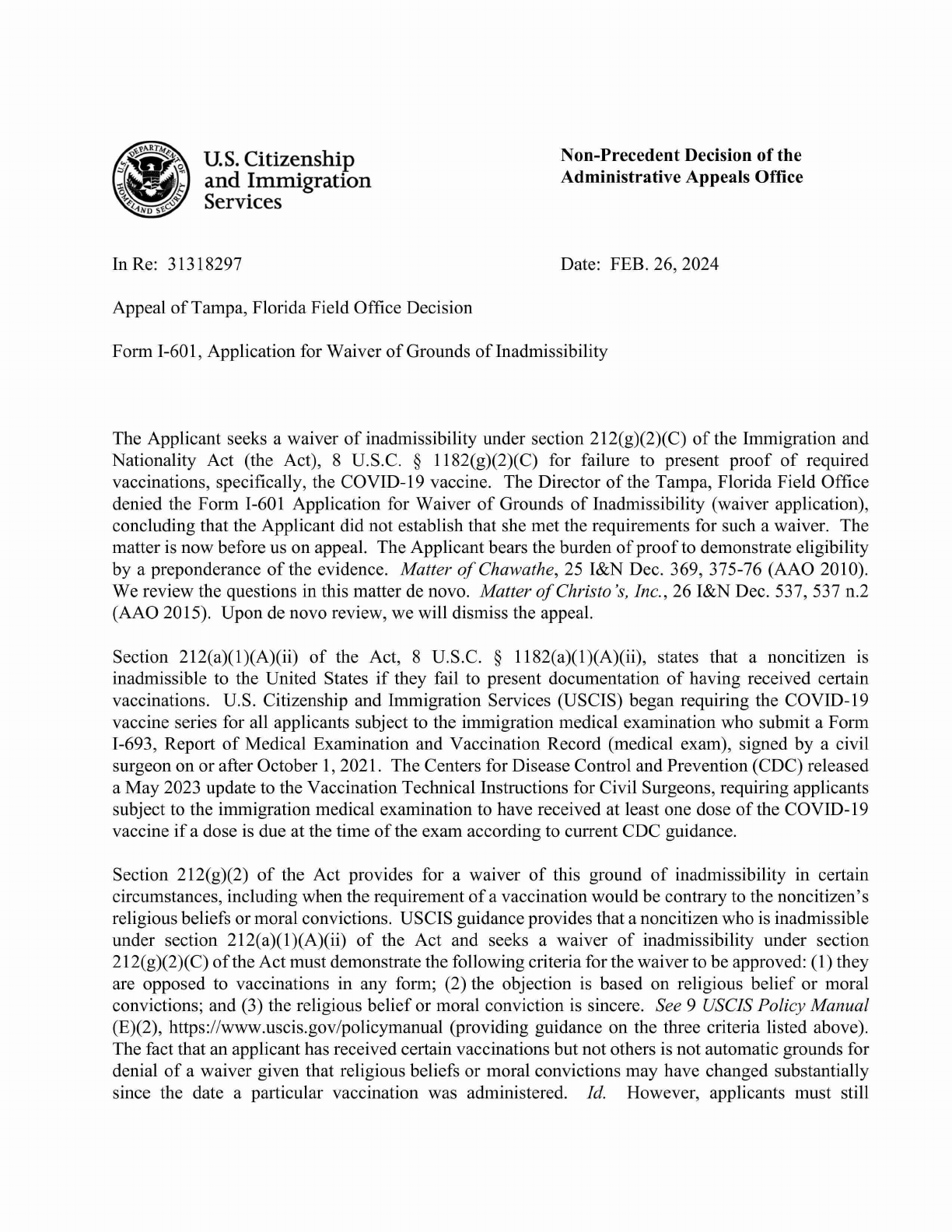
U.S.
Citizenship
and Immigration
Services
Non-Precedent Decision
of
the
Administrative Appeals Office
Date: FEB. 26, 2024 In Re: 31318297
Appeal
of
Tampa, Florida Field Office Decision
Form
1-601
, Application for Waiver
of
Grounds
of
Inadmissibility
The Applicant seeks a waiver
of
inadmissibility under section 212(g)(2)(C)
of
the Immigration and
Nationality Act (the Act), 8 U.S.
C.
§ 1182(g)(2)(C) for failure to present proof
of
required
vaccinations, specifically, the COVID-19 vaccine. The Director
of
the Tampa, Florida Field Office
denied the Form
1-601
Application for Waiver
of
Grounds
of
Inadmissibility (waiver application),
concluding that the Applicant did not establish that she met the requirements for such a waiver. The
matter
is
now before us on appeal. The Applicant bears the burden
of
proof
to
demonstrate eligibility
by a preponderance
of
the evidence. Matter ofChawathe,
25
l&N Dec. 369, 375-76 (AAO 2010).
We review the questions in this matter
de
novo. Matter
of
Christo 's, Inc. , 26 I&N Dec. 537, 537 n.2
(AAO 2015). Upon
de
novo review, we will dismiss the appeal.
Section 212(a)(l)(A)(ii)
of
the Act, 8 U.S.C. § l 182(a)(l)(A)(ii), states that a
nonc1t1zen
is
inadmissible to the United States
if
they fail
to
present documentation
of
having received certain
vaccinations. U.S. Citizenship and Immigration Services (USCIS) began requiring the COVID-19
vaccine series for all applicants subject to the immigration medical examination who submit a Form
1-693, Report
of
Medical Examination and Vaccination Record (medical exam), signed by a civil
surgeon on or after October
1,
2021. The Centers for Disease Control and Prevention (CDC) released
a May 2023 update to the Vaccination Technical Instructions for Civil Surgeons, requiring applicants
subject to the immigration medical examination to have received at least one dose
of
the COVID-19
vaccine
if
a dose
is
due at the time
of
the exam according
to
current CDC guidance.
Section 212(g)(2)
of
the Act provides for a waiver
of
this ground
of
inadmissibility in certain
circumstances, including when the requirement
of
a vaccination would be contrary
to
the noncitizen' s
religious beliefs or moral convictions. USCIS guidance provides that a noncitizen who
is
inadmissible
under section 212(a)(l)(A)(ii)
of
the Act and seeks a waiver
of
inadmissibility under section
212(g)(2)(C)
of
the Act must demonstrate the following criteria for the waiver
to
be approved: (1) they
are opposed to vaccinations in any form; (2) the objection
is
based on religious belief or moral
convictions; and (3) the religious belief or moral conviction
is
sincere. See 9 USCIS Policy Manual
(E)(2), https://www.uscis.gov/policymanual (providing guidance
on
the three criteria listed above).
The fact that an applicant has received certain vaccinations but not others
is
not automatic grounds for
denial
of
a waiver given that religious beliefs or moral convictions may have changed substantially
since the date a particular vaccination was administered.
Id.
However, applicants must still

demonstrate that they oppose vaccinations in all forms and cannot pick and choose among different
vaccinations.
Id.
In August 2022, the Applicant filed the Form I-485, Application to Register Permanent Residence or
Adjust Status (adjustment application) and the waiver application. The Director denied the waiver
application determining that the Applicant had not demonstrated that she is opposed to all vaccinations
or that her son would experience extreme hardship
if
the waiver were denied. Because the Applicant
was found to be inadmissible, the Director denied the adjustment application. The Applicant indicated
she sought an individual waiver
of
the COVID-19 vaccine based on religious or moral convictions on
both the medical exam and waiver application. She also provided a letter explaining that she is a
member
of
the Mennonite faith, a statement from her U.S. citizen son describing how he would suffer
hardship
if
his mother were not granted the waiver, and a family photograph.
On appeal, the Applicant asserts that she was denied the opportunity to explain why she is opposed to
the COVID-19-vaccine, but not other vaccines. After reviewing the totality
of
the evidence, the
Applicant has not established that she is opposed to vaccinations in any form or that her opposition to
all vaccinations is based on religious belief or moral convictions
1
. The Applicant received the Tdap,
Hepatitis B, and varicella vaccinations in July 2022. While receiving certain vaccinations but not
others is not automatic grounds for denial
of
a waiver, the Applicant has not demonstrated that her
religious beliefs or moral convictions changed substantially since the vaccinations noted above were
administered. The Applicant's statement indicates she is a member
of
the Mennonite faith and that
she opposes the COVID-19 vaccine based on her own research and her pastor's advice, however
Applicants must still demonstrate that they oppose vaccinations in all forms and cannot pick and
choose among different vaccinations.
Id.
The Applicant's explanation
as
to why she is opposed
to
the COVID-19 vaccine only is not sufficient to establish eligibility for the waiver based on religious
or moral conviction.
The Applicant also contends the Director failed to issue a Request for Evidence (RFE) prior to denying
the adjustment application. When considering why a vaccine is missing, an officer may request
clarification during an interview or by sending an RFE.
See 9 USCIS Policy Manual (E)(l),
https://www.uscis.gov/policymanual. Accordingly, a RFE is not required although an officer may
request additional evidence. Here the Applicant simultaneously filed the adjustment application with
the waiver application before the officer indicated a waiver was necessary. The Applicant has not
provided support for the assertion that officers must request additional evidence when the waiver and
adjustment applications are filed simultaneously. Further, the Applicant had the opportunity to justify
her religious and moral opposition to the COVID-19 vaccine when filing the waiver application. The
Applicant has therefore not established that she is eligible for a waiver
of
inadmissibility under section
212(g)(2)(C)
of
the Act.
ORDER: The appeal is dismissed.
1
The theological position
of
the U.S. Conference
of
Mennonite Brethren Churches (USMB) does not stand against the
COVID-19 vaccine. See USMB Confession
of
Faith, https://christianleadermag.com/usmb-statement-of-faith-does-not-
support-religious-exemption-to-covid-19-vaccine/
2
